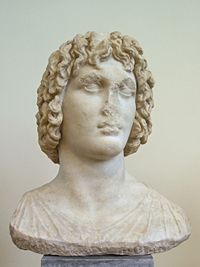Euboulos
- Euboulos
-
Eubouleus
Dans la mythologie grecque, Eubule (en grec ancien Εὐϐουλεὑς / Eubouleús, littéralement le « bon conseiller ») est une figure du panthéon des mystères d'Éleusis.
Mythe
Dans la tradition orphique, Eubouleus est le fils de Dysaules et le frère de Triptolème. Avec ce dernier, il conseille Déméter lorsqu'elle recherche sa fille Perséphone enlevée par Hadès[1].
Dans la tradition éleusinienne, Eubouleus est un porcher englouti par la terre en même temps que Perséphone lorsqu'elle est enlevée par Hadès. En son honneur, les Athéniens jettent des porcs vivants dans les « gouffres de Koré et de Déméter » lors de la fête des Thesmophories[2]. Il joue un rôle important dans le culte d'Éleusis en tant qu'accompagnateur de Perséphone lors de son retour des Enfers. Une inscription sur un relief trouvé dans le sanctuaire d'Hadès à Éleusis l'associe avec deux divinités, Théos et Théa, formant ainsi une triade[3].
« Eubouleus » est aussi une épiclèse de plusieurs dieux : Zeus, Hadès ou encore Dionysos.
Notes
Bibliographie
- (en) Kevin Clinton, Myth and Cult: The Iconography of the Eleusinian Mysteries, éditions du Svenska Institutet i Athen, Stockholm, 1992 (ISBN 91-7916-025-5).
 Portail de la mythologie grecque
Portail de la mythologie grecque
Catégories : Culte héroïque grec | Religion de la Grèce antique | Mythes et pratiques agraires en Grèce antique
Wikimedia Foundation.
2010.
Contenu soumis à la licence CC-BY-SA. Source : Article Euboulos de Wikipédia en français (auteurs)
Regardez d'autres dictionnaires:
Euboulos — In Greek mythology, Euboulos ( good counsellor ) was the father of Carme, who mothered Britomartis by Zeus. He is the son of Dysaules.Euboulos or Euboleus was a swineherd whose pigs were swallowed up by the cleft in the ground when Hades abducted … Wikipedia
Eubulus (banker) — Euboulos (or Eubulus) was from Bithynia, a region on the south shore of the Black Sea. Through his banking prowess, he became ruler of Atarneus in Aiolis (Aeolis) in Asia Minor. He is most famous for his connection to his slave Hermias, who… … Wikipedia
Aphaea — (Greek Polytonic|Ἀφαία; not dark or vanisher ) was a Greek goddess who was worshipped exclusively at a single sanctuary on the island of Aegina in the Saronic Gulf. She originated as early as the 14th century BCE as a local deity associated with… … Wikipedia
Temple of Aphaea — Archaeological site name = Temple of Aphaia name local = Ναος Αφαιας caption skyline = Temple of Aphaia from the northeast. country = Greece region = Saronic Gulf elevation = 160 controlling city = Aegina then Athens peak period = Archaic to… … Wikipedia
Archon (Athen) — Archon (griechisch ἄρχων, „Herrschender“) war im antiken Athen die Bezeichnung für einen hohen Beamten. Das Amt ist auch in anderen griechischen Städten, oder Städten mit griechischer Verwaltung (beispielsweise unter den Parthern) belegt,… … Deutsch Wikipedia
Afaia — Saltar a navegación, búsqueda Templo de Afaia en la isla de Egina. En la mitología griega, Afaia, Afaya o Afea (Griego Ἀφαία / Aphaia; no oscuro, desaparecido) era una diosa griega de la luz, hija de … Wikipedia Español
Eubule (homme politique) — Pour les articles homonymes, voir Eubule. Eubule ou Euboulos (en grec ancien Εὔβουλος / Euboulos) était un homme d État athénien qui vécut au IVe siècle av. J.‑C. Il fut l adversaire de Démosthène, car il était chef du Parti pour la… … Wikipédia en Français
Britomartis — For the butterfly genus, see Britomartis (butterfly). Dicte redirects here. For the fairy longhorn moth genus, see Dicte (moth). Britomartis (Βριτόμαρτις), was the Minoan goddess of mountains and hunting. She is among the Minoan goddess … Wikipedia
Thesmophoria — was a festival held in Greek cities, in honor of the goddesses Demeter and her daughter Persephone. The name derives from thesmoi, or laws by which men must work the land.[1] The Thesmophoria were the most widespread festivals and the main… … Wikipedia
Eubulus (statesman) — Eubulus, or Euboulos (c.405 c.335 BC) was a statesman of ancient Athens, probably the most important of the period 355 342 and notable for his focus on Athenian finances.Eubulus early life is unknown, save that he was from the Anaphlystus deme .… … Wikipedia


